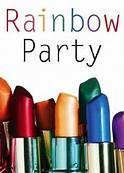 Same Old Sexual Panic
Same Old Sexual Panic
Remember the hullabaloo about the supposed trend of teenagers throwing parties where the girls line up to give all the boys blow jobs while leaving their mark with their lipstick color? Remember all that? Oh boy, our teens were just out of control. Hopefully somewhere along the way you also heard that this was an overwrought exaggeration manufactured to create a stir. No rainbow parties didn’t happen.
Of course if we had taken a few minutes to really think about this, most semi-informed people would have seriously questioned the whole premise. I mean, even highly hormonal teenage boys are not going to be able to sustain for a series of blowjobs in a row, at least not to the hysterical degrees this was described –“I heard every girl on the cheerleading squad did this!”. And even if we are imagining brief oral encounters, the lipstick leaving a distinctive mark thing is highly suspect. But okay, we didn’t think that hard about it. So the interesting question becomes, why do we want to believe these tales when they come around?
Why is each generation so willing to be convinced that the younger generations are having more extreme sex than they did, that sexual morals have turned some terrible corner, that teens need to be protected from themselves? There is simmering moral panic about the new “hook up culture”. And yet, recent studies have found no significant difference in the amount of sex college students have been having for the past 2 ½ decades. That’s since 1984 for those of you feeling math challenged today. A recent look into college kids sex lives, found that of current students 59% reported having sex weekly or more in the past year, compared with 65% in the 1980s and '90s. The groups showed similar patterns in the number of sexual partners in the past year: about 32% reported having more than one partner. Sure there seem to be more liberal ideas and values about sex among younger adults now and less pressure to identify a sex partner as a potential life partner. But if we look all the way back at the Kinsey Studies we see that much of the true sexual revolution has been in choosing to no longer hide sexual behavior that has been common for quite some time. So if sexual behavior is really not all that different than it has been, does that disappoint you?
And maybe that is the crux of it, we want to believe that sexuality is undergoing incredible changes. Maybe the middle-aged among us want to confirm their feelings of alienation from youth culture by thinking that it is ALL different now. Maybe we like to blame any sexual boredom we have now on the belief that “my generation never really got to be sexually free”. Maybe we are all trying to get vicarious fantasy material and want to read about more extreme sexual environments, even if they are made up to outrage us. Certainly the youth don’t want to think about their parents having sex like they are having. And vice versa. But more concerning to me are the underlying fears about sex that I see represented in our ongoing sexual panics about the youth. The fear that sex is an out of control force that only harsh social morals will protect us from. The fear that sex outside the context of married monogamy will lead to chaos. The fear that the existence and availability of sex will victimize us all. The fear that we cannot trust ourselves. Those are the aspects of sex that I hope we are changing, generation by generation.